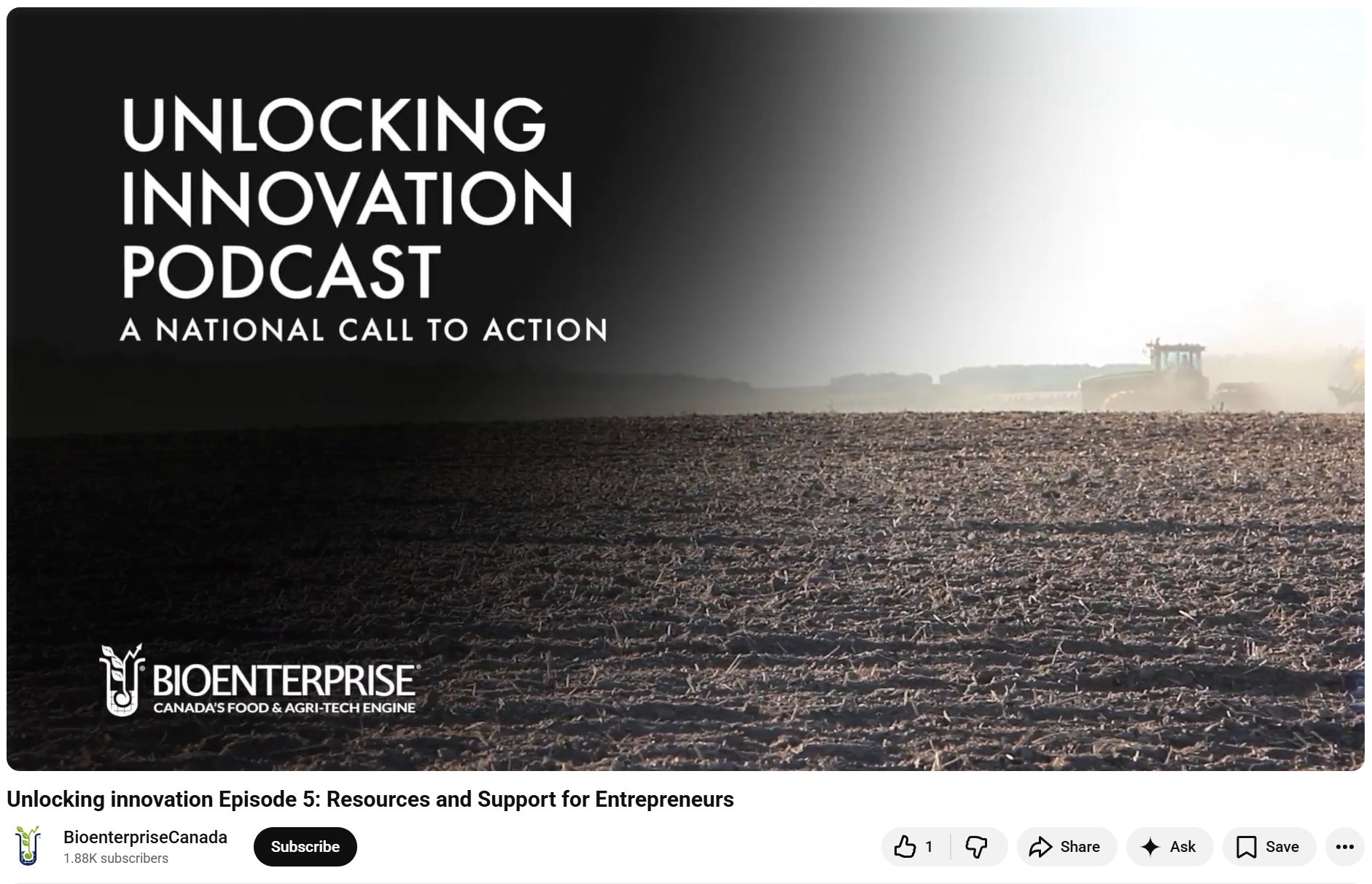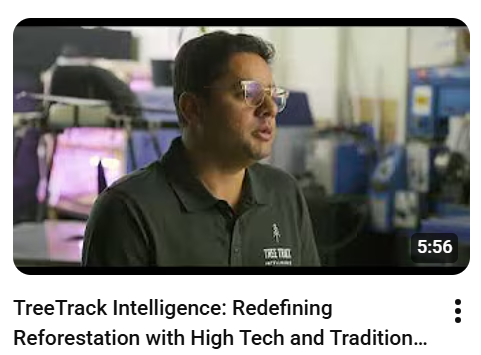
Find the latest resources shaping the bioeconomy
Stories, tools, and resources to grow awareness and momentum for Canada’s bioeconomy.
Latest from the BioCAN Network
Featured Resource
Growing the Bioeconomy We Deserve: Why Canada’s Agri-Innovation Must Move Beyond Potential
By Tabitha Caswell, Content and Grant Writer/Editor for Bioenterprise Canada
Reports
Canada’s Bioeconomy Strategy - Leveraging our Strengths for a Sustainable Future
The Canadian Bioeconomy Strategy was produced by Bioindustrial Innovation Canada in partnership with a writing team (McLaughlin Consultants, BioNB and Anne Waddell) and an advisory committee that has come together under the consortium of BioDesign (made up of representatives from BIOTECanada, FPInnovations and Forest Products Association of Canada). Together, the writing team and committee coordinated and hosted a series of national consultations across Canada to discuss key priorities with industry.
Podcasts
Seeing Innovation and the
Bioeconomy Through the Trees
By Scott Jackson, CEO of the Centre for
Research & Innovation in the Bio-Economy (CRIBE)
Insights with Don Mills and David Campbell - An Acadia Broadcasting Podcast
This podcast combines the experiences of an economist, David Campbell and a social scientist, Don Mills, to explore the challenges and opportunities facing Atlantic Canada, to promote data-driven decision making among policymakers and to encourage a wider dialogue and debate leading to greater prosperity for the region. Expect to hear interviews with the top influencers, business leaders and decision-makers across Atlantic Canada to inform, educate and expand the conversations on the key issues facing the region.
Featured Episodes
There is a Growing Bioeconomy in Atlantic Canada
This episode of the Insights Podcast was recorded live at the 13th annual Biocon Conference in Saint John, New Brunswick. Featuring Meaghan Seagrave, Executive Director of Bioindustrial Innovation Canada, the conversation with David and Don explores the opportunities and challenges facing Canada’s bioeconomy. With companies like Vyterra Renewals, which turns wood into fuel, and Oberland Agriscience, which turns insects into feed and fertilizer, the sector is growing rapidly—but more must be done to accelerate its progress.
Converting Wood into Low Carbon Renewable Fuel in Partnership with Greenspring BioInnovation Hub and Bioindustrial Innovation Canada
JC Amado of Vyterra Renewals and Cassie Turple of Ledwidge Lumber discussed their $200-million collaboration: a 40-million-litre plant using Vyterra’s Rapid Thermal Processing technology and Ledwidge’s by-products to convert wood into low-carbon fuel. Planned for completion in 2027, the facility was set to support 2–3 sawmills affected by the Northern Pulp closure, with potential for two more plants to follow.
From Rocket Scientist to Insect Farmer in partnership with Greenspring BioInnovation Hub and Bioindustrial Innovation Canada
This episode of the Insights Podcast was the second in our bioeconomy series sponsored by the Greenspring Bioinnovation Lab and Bioindustrial Innovation Canada. It featured Greg Wanger, Founder & CEO of Oberland Agriscience, who discussed their new 100,000-square-foot facility in Ragged Lake using Black Soldier Flies to turn organic waste into fertilizer and protein for agriculture, pet food, and aquaculture. Once fully operational, the plant was expected to divert 100 tons of waste daily, producing 20 tons each of fertilizer and feed protein. Wanger, who previously worked with NASA’s Jet Propulsion Lab on the Mars Rover, shared Oberland’s commitment to renewable power and plans for future facilities.
National Labour Market Information Study - BioTalent Canada
Building on Sequencing the Data, the last national full LMI study conducted in 2013 , this new national study gives a much-needed update on the complex, multi-dimensional bio-economy, the companies within it, and the skills and talent they require. Its insights are based on surveys, stakeholder roundtables and interviews, an environmental scan and extensive data analysis.
The study gives Canada’s bio-economy companies a strategic advantage to compete nationally—and globally so that in addition to getting to market faster:
Graduates they hire will leave school with the skills and knowledge to easily transition into a productive workforce.
Newcomers to Canada, with valuable skills, can quickly enter the workforce bringing their diverse perspectives to help access new markets and contribute to solutions.
Stakeholders will have a clear picture of the industry, emerging trends and its employment, to support the voices who promote the impact of the industry on the Canadian economy – regionally, nationally and internationally.
Future talent programs will be developed upon evidence-based industry need.
It all starts with the data upon which this industry is built and drives its innovation.
Ontario’s Opportunities in Forest Bio-Refining - Centre for Research & Innovation in the Bio-Economy
Ontario is on its way to becoming a global leader in advanced wood-based materials & building solutions. CRIBE has compiled an overview of Ontario’s opportunities in forest bio-refining from now through 2030.
Canada’s path to becoming an agri-food innovation superpower - Bioenterprise Canada
Across 7 regions, over 130 participants from more than 120 organizations joined the roundtables, representing 7 key stakeholder groups – entrepreneurs and start-ups, academia, accelerators and incubators, corporate entities, industry associations, investment groups, and government agencies.
Together, they identified over 20 critical barriers and proposed more than 30 actionable solutions to drive Canada’s agri-food innovation forward.
Unlocking innovation Episode 5: Resources and Support for Entrepreneurs
Podcast and video series by Bioenterprise Canada
TreeTrack Intelligence: Redefining Reforestation with High Tech and Traditional Knowledge
Video by Foresight Canada
Unlocking Innovation with RealAgriculture and Bioenterprise Canada
This podcast series, produced for Bioenterprise Canada in collaboration with, and produced by, RealAgriculture, explores how Canada can strengthen its agri-food innovation ecosystem over five episodes. Listen wherever you get your podcasts or watch via YouTube.
The right energy, at the right time for the right purpose
January 20, 2026
Whitepaper from the Smart Grid Innovation Network (SGIN) on Changing the narrative to position Canada as a Global (ALL) Energy Superpower.
From Resources to Strategic Value: Deep Tech and Canada's Materials Future
January 29, 2026
An article from Deep Tech Canada explores how combining advanced materials engineering with bio-based solutions and circular processing can strengthen Canada’s supply chains and position the country as a global leader in next-generation engineered materials.
Building Canada’s Bioeconomy at Home: A Path to Resilience, Security, and Sovereignty in 2026
February 17, 2026
In this article, we explore how scaling Canada’s bioeconomy can build economic resilience, anchor low-carbon manufacturing, and position Canada as a trusted global partner.














